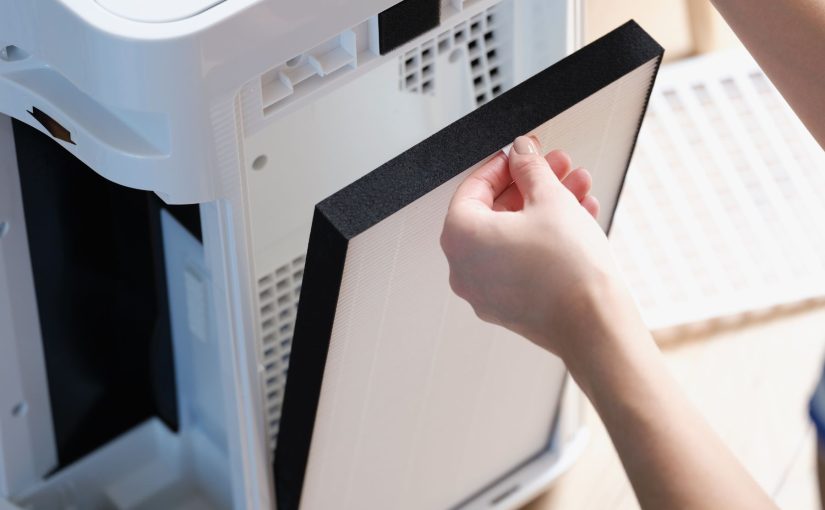Table of Contents
Using HEPA Filters for Smoke Removal and Indoor Air Quality Improvement
Introduction
Indoor air quality has become an increasing concern in recent years, especially when it comes to the effects of smoke exposure. Smoke particles emitted from activities like cooking, smoking, or wildfires can accumulate quickly indoors and pose a serious health risk. An effective solution for removing smoke and improving indoor air quality is the use of air purifiers and HVAC systems equipped with High Efficiency Particulate Air (HEPA) filters.
HEPA filters are specifically designed to capture extremely small particles that other filters cannot. This makes them ideally suited for removing smoke particles and preventing them from circulating back into the air. Installing the proper HEPA filter for your needs can drastically reduce smoke odor and smoke damage to your indoor environment.
This article will provide an in-depth look at HEPA filter technology, examine the benefits of using HEPA filters for smoke removal, and discuss key factors to consider when selecting the right HEPA filter for your situation.
What are HEPA Filters?
HEPA filters are a type of pleated mechanical air filter that can remove at least 99.97% of particles sized 0.3 microns from the air that passes through them. This includes:
- Fine particles like smoke, dust, pollen, mold spores
- Bacteria and viruses
- Pet dander and other allergens
To qualify as true HEPA, filters must satisfy specific standards for particle capture efficiency set by the United States Department of Energy.
HEPA filters achieve this level of filtration through dense mesh screens of randomly arranged fiberglass fibers. As air flows through the filter, particles get trapped in the maze of fibers and cannot pass through to the other side.
This unique structure allows HEPA filters to capture particles much smaller than other filter types like fiberglass or pleated filters. That’s why they are indispensable for removing smoke and improving indoor air quality.
Why Filtration is Vital for Smoke Removal
There are several reasons why filtration with HEPA filters is so important when dealing with smoke indoors:
- Smoke contains tiny particles and gases that can be easily inhaled and cause health issues.
- Many components of smoke like soot and ash will quickly settle on indoor surfaces, leading to smoke damage and odor.
- Without proper ventilation and filtration, smoke particles will persist in the air for long periods.
- Standard low-MERV filters are not enough to effectively capture smoke particles from the air.
HEPA filtration is the most reliable way to eliminate recirculating smoke contaminants from the indoor space. By installing the correctly rated HEPA filter, you can actively clean the air and provide a safer, healthier indoor environment.
How Do HEPA Filters Work?
HEPA filters use a very straightforward yet ingenious mechanical process to remove particles from the passing air stream. Here are the basic steps:
- Air is drawn into the filter, usually by a fan or the central HVAC system airflow.
- The air passes into the densely packed layer of randomly arranged fibers.
- Particles in the air stream get trapped within the maze of fibers and adhere to them through processes like interception, impaction, diffusion, electrostatic attraction.
- Clean, filtered air passes through to the other side while contaminants stay embedded in the filter.
HEPA filters use random fiber meshes to capture particles
The dense structure of HEPA filters means they can capture much smaller particles than other common filter types. Here’s a comparison:
| Filter Type | Typical Particle Size Captured |
|---|---|
| HEPA | 0.3 microns and above |
| Pleated | 3-10 microns |
| Washable | 10+ microns |
As you can see, the microscopically fine smoke particles from combustion are too tiny for standard filters but get easily stopped by HEPA filters.
 Benefits of Using HEPA Filters for Smoke Removal
Benefits of Using HEPA Filters for Smoke Removal
Installing the appropriate HEPA filters can profoundly improve indoor air quality in the presence of smoke by delivering the following benefits:
Improved Indoor Air Quality
The most obvious advantage of HEPA filters for smoke is cleaner indoor air. HEPA filtration actively reduces the concentration of airborne smoke particles, helping restore air quality to safe levels. This makes the indoor environment healthier and more comfortable.
Reduced Health Risks
Removing smoke particles with HEPA filters greatly minimizes adverse health effects associated with smoke exposure such as:
- Respiratory irritation
- Asthma attacks
- Allergic reactions
- Eye, nose and throat irritation
- Headaches
- Lung inflammation
By preventing you and your family from inhaling harmful smoke contaminants, HEPA filters reduce the chance of developing both short and long-term health issues.
Protection of Indoor Spaces
In addition to health impacts, smoke particles also lead to physical damage to the home from soiling and discoloration. Over time, smoke odor also becomes absorbed into soft furnishings like carpets, drapes and upholstery.
HEPA filtration helps safeguard your indoor spaces by capturing airborne smoke before it has a chance to settle and cause damage. This prevents deterioration of indoor surfaces and materials.
Smoke Odor Reduction
Smoke odor lingers long after visible signs of smoke clear thanks to microscopic particles embedding in textiles. Powerful HEPA air purification helps neutralize stubborn smoke smells by removing the lingering particles causing the odor from the air. This helps restore indoor air freshness.
Types of HEPA Filters for Smoke Removal
There are a few common systems that utilize HEPA filters to eliminate smoke from indoor air. The right option for your needs depends on factors like room size, portability requirements, and efficiency targets.
Portable Air Purifiers
For smoke removal in single rooms or small spaces, portable HEPA air purifiers offer flexibility and convenience. Compact standalone units with built-in fans, HEPA filters, and other filtration stages allow you to move clean air power wherever it’s needed most.
Many portable purifiers include special features for smoke removal like activated carbon prefilters to adsorb gases. Portable units come in all sizes suitable for different room capacities.
HVAC Air Filters
Installing HEPA air filters designed for HVAC systems is an effective way to filter smoke throughout an entire building. High-grade filters like MERV 13+ rated pleated HEPA filters will clean air passing through central ventilation systems and heat pumps.
However, HVAC HEPA filters work for smoke removal only when the HVAC system is actively running. Portable units or standalone air cleaners provide constant air filtering.
Standalone HEPA Air Cleaners
For spaces too large for portable purifiers but without central air handling, standalone HEPA air cleaners are a great smoke filtration solution. These floor models are built just like portable purifiers but with increased power and fan capacity for large areas.
Standalone air scrubbers with HEPA filters offer smoke removal abilities on par with HVAC filtration but in a self-contained, portable package. Many include multiple fans and HEPA filters for rapid air exchange in large open spaces.
Choosing the Best HEPA Filter for Smoke Removal
When selecting HEPA filtration systems for removing smoke particles, keep the following factors in mind:
Room Size
Always match the HEPA filter system capacity and power with the size of the space needing smoke relief. Undersized air cleaners will not provide sufficient air exchange. Check manufacturer recommendations and AHAM CADR ratings.
For large rooms, standalone HEPA air scrubbers provide the strongest filtration. Multiple portable units may be needed for very large spaces.
Filtration Efficiency
Select units rated at true 99.97% HEPA specification to properly remove smoke particles. MERV 13 – 16 pleated filters are suitable options for HVAC systems.
Added filter stages like activated carbon and prefilters help remove gases and large particles before the HEPA filter for better overall filtration.
Noise Levels
More powerful air scrubbers and purifiers often generate significant noise which could be distracting. Check noise ratings and operating volumes before purchasing if noise could be an issue.
Maintenance Requirements
Smoke contamination will clog up HEPA filters faster than normal use. Be prepared to replace filters 1-2 times more frequently when using for smoke removal. Choose units with convenient filter access.
Portable purifiers and standalone air scrubbers allow quick DIY filter changes. HVAC filters may require professional service for access.
Conclusion
Smoke exposure indoors poses a real health and air quality hazard that standard filtration cannot adequately address. Installing advanced HEPA filtration systems offers a proven solution to remove airborne smoke contaminants and restore indoor air freshness.
Based on their superior particulate capture properties, HEPA filters are uniquely suited to eliminating recirculating smoke from indoor spaces. Using portable purifiers, HVAC filters, or standalone air scrubbers fitted with true HEPA filters will effectively improve indoor air quality in the aftermath of events producing heavy smoke.
Carefully select the HEPA filtration system matched to your room size, efficiency needs, noise limits, and maintenance considerations. Prioritizing high-quality HEPA filters designed for smoke removal will pay off with healthier indoor air and reduced smoke damage to your home. By actively filtering smoke particles, HEPA air purifiers provide clean, fresh and breathable indoor air when you need it most.
Recommendations for Choosing HEPA Filters
- Focus on systems using true 99.97% HEPA media for adequate smoke removal. MERV 13+ pleated filters work for HVAC systems.
- Match the filter capacity with room size. Undersized units will not provide sufficient air changes.
- Consider noise levels. More powerful units can generate distracting noise.
- Plan on frequent filter replacements when used for smoke filtration. Easy access is ideal.
- For localized smoke situations, portable HEPA air purifiers offer flexibility to move clean air where needed.
- Standalone commercial HEPA scrubbers are ideal for large, open areas without existing air handling systems.
- Consult HVAC professionals to install upgraded HEPA filters in central air systems for whole-building smoke filtration.


